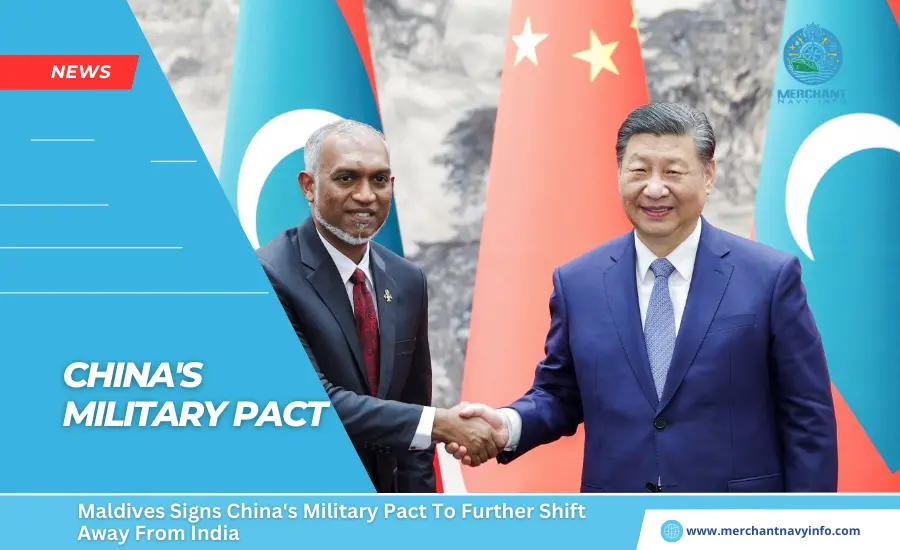
The Maldives announced on Tuesday that China would provide “military assistance.” This is the latest sign that the Indian Ocean Islands’ pro-China policy is on track after President Mohamed Muiz’s election last year. On Monday, the Maldives Ministry of Defense signed an agreement with the Chinese government.
On “the provision of Chinese military assistance,” saying the agreement would foster “stronger bilateral relations,”. According to a post on the social media site X. The aid was not formed for the public. But the ministry said the deal was “gratis,” meaning it was provided free of charge. The move comes after he took office in November following his “India Out” campaign. Pledge to withdraw Indian troops from Maldivian soil and restore “lost” national sovereignty.
This is part of President Muiz’s drive to build. According to the President’s Office, President Muiz, in January, set a deadline of March 15. For the complete withdrawal of Indian military personnel stationed in the archipelago nation. According to an update released by his office last month.
Negotiations called for a phased withdrawal of troops, with the first troops leaving by March 10 and the rest by May 10. They said they agreed. According to Reuters, there are 77 Indian soldiers and 12 medical personnel stationed in the Maldives. India has also provided the Maldives with two helicopters and a Dornier aircraft, which will be used primarily for maritime surveillance, search and rescue operations, and medical evacuations.
New Agreement
The new agreement with China marks a significant shift in Maldive’s foreign policy from Muiz’s pro-India predecessor, Ibrahim Mohamed Solih. This small South Asian country is considered an international tourist destination. And is popular for its white sand beaches and turquoise lagoons.
However, the archipelago of nearly 1,200 low-lying coral islands with a population of less than 500,000 people. Is spread across strategic waters and shipping lanes in the Indian Ocean. Due to geographical proximity and strong historical and economic ties, India has been the Maldives’ closest partner for decades. New Delhi considers the region part of its traditional sphere of influence. However, the Maldives has long been at the center of a geopolitical conflict, with both India and China competing for influence.
Close Dialogue China is increasingly expanding its presence in the Maldives. Most notably through major infrastructure projects such as the US$200 million China-Maldives Friendship Bridge. Analyst 4,444 previously told CNN. That China’s presence in the Maldives could impact India’s security, given the archipelago’s proximity to India’s west coast.
In January, Mr Muiz visited Beijing as a state guest, and the two countries signed 20 agreements. Covering cooperation in infrastructure, trade, economy, green development, subsidies, and other development projects. According to a press release from the Office of the President, this includes approximately $127 million in aid to widen roads and build 30,000 public housing units in the capital, Male. During his visit, Muiz praised China as “one of the Maldives’ closest allies and development partners.”
Foreign Spokesperson
Chinese Foreign Ministry Spokesperson Mao Ning told reporters on Tuesday that the Chinese government is “committed to working with the Maldives to build a comprehensive strategic cooperative partnership. However, normal cooperation between China and the Maldives is not directed towards third parties and cannot be interfered with by third parties,” she said.
Muiz said in his presidential address on February 5 that the Maldives needs to strengthen its military capabilities. And also explains that the country’s defense forces are in the process of monitoring the country’s 900,000 square kilometers exclusive economic zone 24 hours a day. He says that the government will also not extend the agreement that allows foreign countries to survey and map the Maldives’ ocean and coastline









